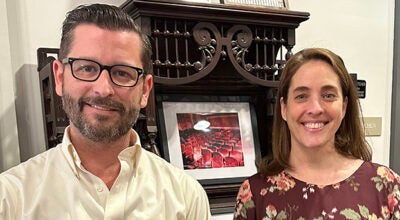AOP participates in national arts economic impact study
Published 6:01 pm Monday, June 6, 2016

- ARTS OF THE PAMLICO SEEKING FEEDBACK: Arts of the Pamlico Executive Director Joey Toler hands out Arts and Prosperity Report surveys during the Ocrafolk music festival on Ocracoke this weekend.
Beaufort County will see exactly how the arts impact the local economy through participation in a nationwide survey.
The Arts and Prosperity Report, a project created by the national arts nonprofit Americans for the Arts, provides real numbers about the arts, their draw and how much money arts supporters spend, according to Joey Toler, executive director of Arts of the Pamlico.
“We’ve had numbers to work with in the past, but the result of this particular survey we’ll be able to drill down to Beaufort County specifically, Washington specifically and even the Turnage Theatre, specifically,” Toler said.
The surveys are anonymous, voluntary and are offered to attendees of a variety of events, asking how much money those surveyed spent on tickets, whether they traveled from out of town for the event, if they went out to dinner, bought souvenirs and more. AOP has made the surveys available as much as possible, from exhibit opening receptions at the Turnage Theatre and theatre rentals to the Ocrafolk music festival, held on the island of the Ocrafolk.
“We’re trying to get numbers from everything,” Toler said. “They’re useful to have
when you’re fundraising; when you’re talking to your local government and asking for support. It’s useful on the state level when our legislators are talking about the funding for North Carolina Arts Council, which supports us, especially with the Grassroots grants.”
Grassroots grants are part of the support for the Ocrafolk music festival, and as Hyde County falls under the umbrella of Arts of the Pamlico, Toler was on the island over the weekend handing out surveys to those attending the popular annual event. At Ocrafolk, the economic impact of the arts is evident, Toler said.
“Particularly with the Ocrafolk festival, people just don’t come in and out,” Toler said. “They come and stay for days; they’re eating out constantly, they’re buying stuff to take home.”
Ultimately, the point of the surveys is to show real data that can be used to prove a case of continued support of the arts, from an economic standpoint.
“If you can really make the case that the arts have an economic impact, then people are more likely to invest. And like any good investment you want to see good numbers,” Toler said.





